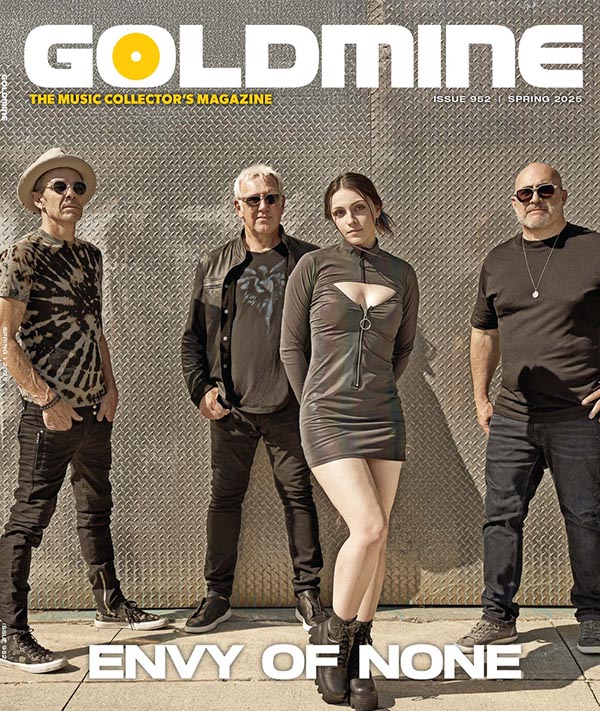
|
Goldmine Magazine - Issue #952, Spring 2025 by Patrick Prince |

The Canadian-American Rock Group 'Envy of None' kick it up a notch on their sophomore effort.
Guitarist Alex Lifeson files Goldmine in with the details.
The distinctive electric guitar sound of Alex Lifeson, which is
so familiar to Rush fans worldwide, has
turned more atmospheric and nuanced
with the group Envy of None (EON).
Envy of None are a supergroup of sorts,
with the founding guitarist of Rush joining bassist Andy Curran (Coney Hatch),
guitarist-keyboardist Alfio Annibalini
and vocalist Maiah Wynne. The group’s
self-titled debut album, released in 2022,
impressed many, but it is the sophomore
album, titled Stygian Wavz, that has really opened eyes. With its moody, heavy
and melancholic approach, it has a Stygian feel to it, as if the group are virtually
crossing the River Styx.
Lifeson, calling from his home in
Canada, and back from a health resort in
Europe, appears relaxed and optimistic
about the latest studio album.
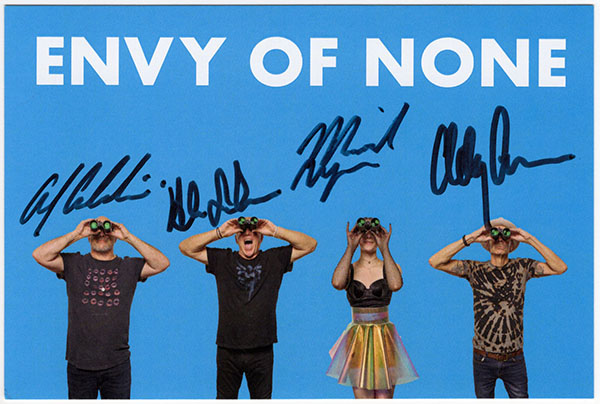 GOLDMINE: Let’s talk about the new studio album, Stygian Wavz. There’s definitely
not a sophomore curse here because, in my
opinion, it’s better than the first album.
GOLDMINE: Let’s talk about the new studio album, Stygian Wavz. There’s definitely
not a sophomore curse here because, in my
opinion, it’s better than the first album.
ALEX LIFESON: I totally agree.
GM: And I think that all around, it seems like you’ve grown as a team more.
AL: Absolutely. And that’s exactly how
we feel. The first record, we didn’t know
each other. I mean, I knew Andy [Curran]; I’ve known Andy for many years,
but we never worked together. He was in
his own band, and he worked at our office
[Anthem Records] as an A&R guy, and
Alf [Annibalini] I heard of but I’d never met him. And Maiah [Wynne], of course,
was a mystery. So the first record, I think
we were kind of feeling each other out,
seeing what our boundaries were or what
anyone’s specialty was and all of that.
And it was a great experience working on that first record. It was great to see, to
hear Maiah. She came in very strongly.
I mean, the music was quite dark on our
first record, and heavy at times, and her
voice is so fragile and kind of sits on top
of that. And it was a really nice contrast.
With the second record, I think we just
felt like we knew each other much better.
We were no longer just an outfit making
some music. We were now a band.
And when I got the finished album back
mastered and in sequence, I hadn’t listened to it for four or five days and put it
on. I was like, “Wow, we are a band. This
is a band. This sounds like a band.” So I
think we’ve just matured, developed and
progressed in every way possible. Maiah
was 19 when we started out with her, and
she’s, what, 27 now? And she’s brilliant on
this record. She’s bordering on genius at
times, so she’s really evolved and matured
a lot as a singer, a lyricist and a writer.
She’s just amazing.
GM: She has an amazing ethereal voice.
It has both this heavenly and melancholic
combination to it, which is rare. There’s
a standout track on the new album called
“The Story,” and your guitar playing and her
vocals match perfectly. You have this sort of
melancholic dreamscape going on, where
your guitars are intertwined, and then in
comes a guitar lead that is as sharp as a razor, and it’s as painful as her lyrics, and it just
matches it so beautifully. I think that’s one of
the best songs on the album, quite frankly.
AL: It’s definitely one of our favorites.
Maiah and I, on the first record, we
established a relationship, a very close
relationship, and we would share files
back and forth. The song starts as this
seed, and it expands to adding scratch
guitars and vocals and things like that.
Then it gets to the point where we’re
shooting for finals, and then it becomes
Maiah and me just going back and forth,
back and forth, until we reach the peak
and hopefully know that we’ve arrived.
We dance together when we write. Really,
she is my muse. She’s become such a huge
inspiration to me. We just have a really,
really special relationship, and there’s a
gap of half a century between us, and it’s amazing that when we’re writing, we’re
like soulmates. We’re the same. It’s really uncanny. And that song, I really got
to stretch out on that song. The bridges
have this ethereal high guitar that plays
a melody that’s very plaintive. And then,
like you pointed out, the solo has grit and
emotion.
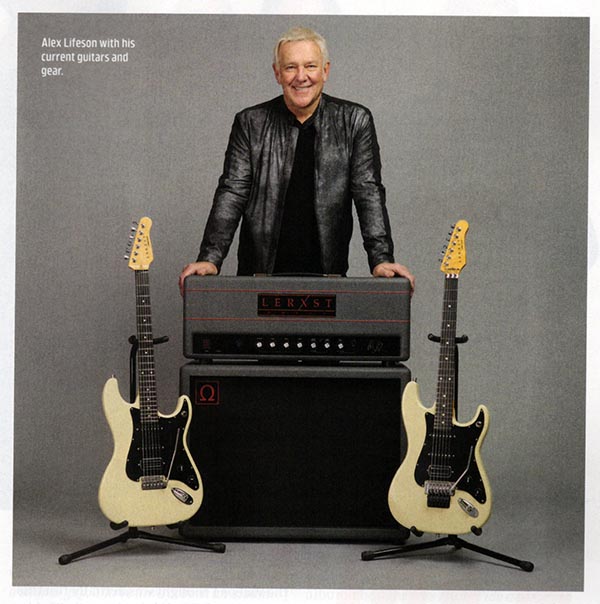 And I stand away from doing solos
because I don’t want it to seem like a
showoff. And a lot of people just throw solos in just to do that. But I think the solo
should be an integral part of the song. It
should echo what’s going on in the song.
It should be in the service of the song, and
not just a solo moment. So I pick up on
what she’s talking about and how she delivers it, and then I try to create the solo
in such a way that it rises to this crescendo. And then she comes back in and... I'm
getting goosebumps talking about it. She
comes back in, and then it’s that post-solo
section that is my favorite part of that
song, driving. It’s so full of plaintive emotion and trying to drive that point home.
And you never always feel successful as a
person when you're feeling that way. And
this is what it had to show. And I think we
were successful with that song. There’s
something that’s really balanced about
that song. All the parts fit pretty well. I
got to play my Rickenbacker 12-string in
the choruses, which is a treat. So it gives it
that little bit of 60s flavor in a way. But I
think structurally that song is the perfect
example of how we write.
And I stand away from doing solos
because I don’t want it to seem like a
showoff. And a lot of people just throw solos in just to do that. But I think the solo
should be an integral part of the song. It
should echo what’s going on in the song.
It should be in the service of the song, and
not just a solo moment. So I pick up on
what she’s talking about and how she delivers it, and then I try to create the solo
in such a way that it rises to this crescendo. And then she comes back in and... I'm
getting goosebumps talking about it. She
comes back in, and then it’s that post-solo
section that is my favorite part of that
song, driving. It’s so full of plaintive emotion and trying to drive that point home.
And you never always feel successful as a
person when you're feeling that way. And
this is what it had to show. And I think we
were successful with that song. There’s
something that’s really balanced about
that song. All the parts fit pretty well. I
got to play my Rickenbacker 12-string in
the choruses, which is a treat. So it gives it
that little bit of 60s flavor in a way. But I
think structurally that song is the perfect
example of how we write.
GM: And the lyrics. Wow. I mean, its lyrics
have that Bowie-esque feel to them — of desperation — like the song “Heroes.” I mean, I
wrote one line down from it: “If I could be a
better version of me, Id step into a mirror and
come back clean.”
AL: Yeah. Awesome. She’s way beyond
her years. “I could be the hero of the
story.” Who doesn’t feel that way? Is
there a single person in the world who
doesn’t feel that way? And she articulates
it in such a way that it just hits home.
GM: Right. And songwriting is different
now with collaboration, right? Before, and
you know this, you get ina room or you're on
tour and you're kind of face-to-face with the
person. Now you can Dropbox stuff, and send
it over the internet. I mean, how do you find
the difference? Did it take you a while to get
used to that?
AL: Well, no, not for me. I think in the early days —and when I say the early
days, back in the ’70s, ’80s, ’90s — it was
much more common to work in the room
together. So you set up, you start playing,
baffles are up, you’re in the room, with
the vibe, there’s the energy in the room
while you’re working and all of that. And
that was great for the time. But even with
Rush, not even in the later years, probably
by the mid-’90s, we were working quite
differently. We would bring stuff that we
were working on independently, and sort
it out and create guides, and then start
recording.
The first [EON] album we had the
pandemic to deal with, so we had to share
a file. And, honestly, I love working that
way. I can spend hours doing something
and if I don’t like it, I can just erase it. No
one is there to tell me not to do that, or
give me ideas. Why don’t you try this? Why
don’t you try that? I can just work away in
my own space and create the things that
I want to create in the way that I want
to create them. And Maiah is the same
way. It’s just a much more efficient way of
really getting the results that are truer, I
think, in the long run.
GM: Right. And it’s interesting because,
speaking of Rush, I picked out this quote from you. You said, “It’s not about that guy
from Rush anymore.” And a few minutes ago
you said you like the fact that there doesn’t need to be the obligatory guitar solo. Like, “OK, I need to hear Alex have his guitar solo.” And that’s what I’m assuming you're talking about. Because the guitar is not the center of attention here, even though you are the guitar guy. But it is also true that the guttar is more inthe fore on this album. Would you agree?
AL: Yeah, it is. And I think, again, the first record was sparser. It was sometimes more driven with keyboards, and very rhythmic and all that stuff. It was just a different kind of sound. And I think with this second record, Stygian Wavz, we started writing more funky stuff. We started writing more rock stuff and less of that dark, trippy, industrial kind of thing. So naturally it all sort of evolved that way, and that, with her vocals juxtaposed against the music, it’s still a very powerful way of getting our music across.
GM: You say “funky.” There was one song in
particular on the album that had a no-doubt type funkiness to it — “Handle With Care.”
AL: Oh, there’s lots. “Thrill of the Chase,”
“Not Dead Yet,” ’Stygian Waves.” They’re
all super-funky songs.
GM: And, ironically, I think the best song
might be the title track at the end. That's
a unique-sounding song. It’s hard to write
a unique song nowadays. The song has all
these international sort of flavors in it. It’s
very interesting.
AL: It’s very bombastic, that song. That
was the last song that we worked on.
Our working title for that was “Wham
Bam,” because it had that kind of power
to it, and it was almost like a dance-y
sort of track, so couldn’t have that, right?
(laughs) So I started laying heavy guitars
on. I played an oud. I’d never played an
oud before, so I spent some time on it.
GM: Sorry. What is an oud?
AL: It’s a Middle Eastern instrument. It’s
avery common instrument throughout
the Middle East from Turkey to Iran. And
everybody has their own version of it. The
Turks version is different from the Iraqi
version, etc., but its history dates back to
the lute, and it was an instrument that’s
derived from that point. So there’s a little
oud solo in the middle section, but there
are lots of heavy guitars. There are lots
of big drums, and her vocalizations are
amazing. She just let loose. She didn’t
have to sing lyrics, so she wanted to have
fun with her vocals. When she does her
vocal, she sends 25 tracks of vocals in,
and everything is completely finished. All
the effects are the way she wants them,
and she has avery clear idea of exactly
what she wants the vocals to look like and
the kind of impact they want in the delivery. I’m actually surprised about “Stygian
Waves” that that’s acommon thing I’m
hearing. It’s a favorite of a lot of people
I’ve talked to. And we never would’ve
expected that.
GM: Maybe it’s good that it bookends the
album. You start with a powerful song and
end with a powerful song. That kind of makes
sense. And “Stygian Waves” is a good title.
Better than “Wham Bam.”
AL: Yeah, I agree with you there.
GM: But the title alone, Stygian Wavz for
the album, it kind of makes it sound like we're
in for some gloomy waters. Right? Like you're
crossing the Styx.
AL: That’s it.
GM: But I was surprised the album cover
didn’t have the River Styx on it. The first album was, I think you used the word gloomy,
but there’s definitely questioning in the
lyrics of “What’s it all about?” Existential,
maybe, that sort of same feel. Did you help
write some of the lyrics yourself, or was it all
Maiah?
AL: No, no, no. I don’t write lyrics. Believe me, I’m not writing the lyrics, and
I’m not singing.
But we like to think the album cover
has nothing to do with anything. It’s just
a cool, interesting graphic. And we used a
similar graphic style for the first record,
so we’re just maintaining that mode. But Stygian Wavz... the world is a crazy
place right now. Crazier maybe than it’s
ever been. I don’t know. Maybe not. But
certainly in our lifetime, it is. Waters are
very turbulent. We are approaching the
Gates of Hell. But like the song, we believe that there is a way to navigate those
waters and to find calmer waters, and
that’s the way this song ends. It comes down from that chaos, and it’s soft and it's
meditative almost. There’s hope. I guess,
there’s always hope, and we all have our
fingers crossed.
GM: That’s the nice balance in the lyrics,
that there’s concern and then there’s hope.
Now, you guys take a lot of pride in your
music videos. The music videos are terrific, but you've always taken pride in music
videos, going back to Rush. And the music
video format is still kind of the same, but how
you present it is different, right? I mean, I can
remember as a kid watching MTV and waiting for the new Rush video to come on. Now, I could just go to YouTube. It’s that easy. So how do you think these videos work for the listener or watcher?
AL: Yeah. I don’t know. I don’t know if
we spent a whole lot of time worrying
about that. We provide a video for songs,
especially when we are releasing these
singles like the record company wanted
us to do. I’m not a “singles release” kind of
guy. I believe in the album. That’s what I prefer. But I understand it as a marketing
tao; it’s important to them. And doing
the videos I thought was actually fun this
time around. We did those couple of videos in AI with a videographer in Bueno
Aires, and I think he did an amazing job,
because really for me, what it boils down
to is I want to look at something cool. I
know what the song is. I probably own
the song. I just want to look at something that’s cool, that’s going to grab my
attention and make me watch. It doesn’t
have to be the story of the song. So those
videos are super powerful, [like] “Not
Dead Yet.” I must have watched that 150
times because I just see something different every time I watch it. They’re really,
really powerful. And I understand there’s
areal argument between the crowd that
embraces AI and the crowd that doesn't.
Fear of robots that are going to kill us is
real, maybe. But as farasa technology, it’s
amazing.
GM: Yeah, there is a fear. The fear is that
popular music is going to be written and
produced by AI, and you hear concern from
musicians. You hear concern from everyone,
really. So do you have a general fear of it, or you're just like, I’m living in the now, I'm not
going to be concerned.
AL: I don’t know. I guess maybe a little
bit, but what does it matter? It’s not going
to change anything.
GM: It’s too much to worry about, right?
AL: I don’t have a voice. No one has a
voice anymore in anything. There are just
a billion voices screaming all the time
now. Lying. Lying has become such an
integral part of society now. Don’t get me
started.
GM: So, I want to touch on touring now.
There was a quote from Andy Curran, who
said that he would love to play in 3,000-person
venues.
AL: Yeah. Small theaters.
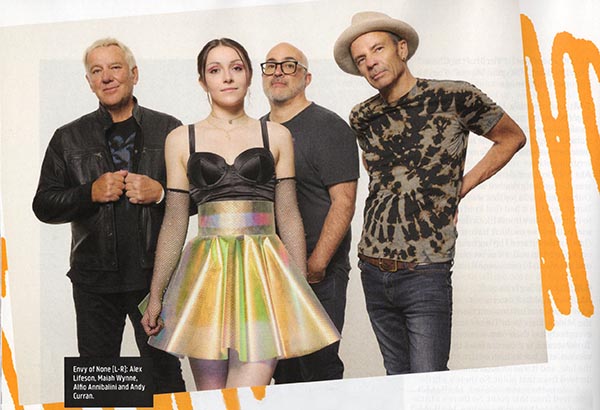 GM: Where there’s a good sound, right? It
doesn't have to be an arena. Are there any
plans to tour?
GM: Where there’s a good sound, right? It
doesn't have to be an arena. Are there any
plans to tour?
AL: I think for us to play these two albums, an evening of this music in a small
theater with a nice light show, would
be spectacular. It would be such a cool,
emotional evening of music. We would
love to do it, but we had our agent look into it. He came back with some numbers,
and he said, “Yeah, you could do it. And
you'll only lose thousands and thousands
of dollars.” So I think what we’re going to
do is hold off and see what happens with
the record. If the record does well and
there’s interest, and we can do acouple
of nights in a theater, then we would seriously consider it. Because honestly, I’ve
already got in mind the musicians I would
like to invite to play with us that evening
just to fill out that amazing, dense sound.
So, we’re open to the idea, and we'll see if
there’s an opportunity coming up.
GM: Well, one of the great things about
streaming today, you could actually play
one gig and then just stream it to the masses,
right? Instead of touring
AL: Yeah, you could do that, but you need
those masses, first of all. And I think
there’s a good chance that we’ll increase
our audience. I mean, I think this record
is such a great record to listen to, and
music is such a wonderful language. I
really hope it does well, because I think it
deserves it. I’m not talking about royalties and money and all that stuff. Just to
have something that sounds beautiful
and elicits all kinds of emotions when
you listen to it, is a wonderful thing to be
a part of.
GM: And it’s not easy for young bands
nowadays. It’s so different than... well, I
know you could tell the stories about Rush,
when first beginning in clubs and having to
work your way up, and I’m sure it was hard
to also cross the line over to America to get
accepted, but I think it’s so much harder
nowadays. I don’t know what your opinion on
it is, but it seemed like back then, if you made
it, it was easier to make money. It was easier
to make a living.
AL: It’s very, very different. It’s turned
on its head. In the beginning when we
toured, when we first got our record deal,
I mean, we worked for six years playing
high schools and bars and that whole
thing. Fun. We were young. We were in
our teens. When we got our record deal,
we were 20 years old. The prospect of
touring America was amazing. We were
going to make five records on that record
deal. So it was an opportunity, and you
took advantage of it. You decided to work
hard. We played 250 shows a year. We
made two records a year. You work, work,
work when you have that opportunity, and back then you did as many dates as
you could for the exposure. So you could
sell records. It didn’t matter how much
money you were making at the gig, so
long as people were coming out and were
buying your records. Now it’s the total
opposite. Records mean nothing. There’s
no such thing anymore, really. And it’s all
about live performance, and that’s a way
harder nut to crack, you know. I guess you
could probably do some circuit of small
gigs that probably still exist. I would
think. But to go beyond that and to crack
each stage from those small theaters into
6,000-seat halls, into 9,000 seaters into
arenas, that took us 40 years to travel
that journey. Now, I don’t know how anyone can make a living.
Of course, unless you have a big hit that
gets thousands or millions of hits online.
It’s so different.
GM: That’s true. Yeah. I didn’t even bring
up the Spotify thing. Right. You're absolutely
right.
AL: Even then, millions and millions of
hits or downloads, you're still getting a
tiny fraction. What is it, 0.03 percent or
something that is insane. Insane. Some-
thing ridiculous.
GM: Well, you said that you've never been a singles guy. You’ve always been an album
guy, so I’m assuming you're into vinyl.
AL: Yeah. I love the idea of vinyl; I think
new vinyl, if it’s new vinyl. It’s much
different. It’s thicker than it was back in the old days. Its dynamics are much
better. We pressed a bunch of vinyl for
this record. Everything sold out, so we’re
frantically pressing more. We did these
metallic-plated records that we’re doing
for a contest, and we did one for each of
us. It’s beautiful. It looks stunning. It’s
amazing. Do I have a turntable? No, I
don’t have a turntable. I’m here in my
studio. I have big, giant, crazy monitors,
and I do all my critical listening in here.
I think maybe if I can find a little 18-inch
square area I can puta turntable, maybe
I'll get one. But right now I’m relying on
my friends that have turntables and what
their opinions are.
GM: Well, the album is produced so well that it’s perfect for vinyl.
AL: Yes. Yeah, exactly.
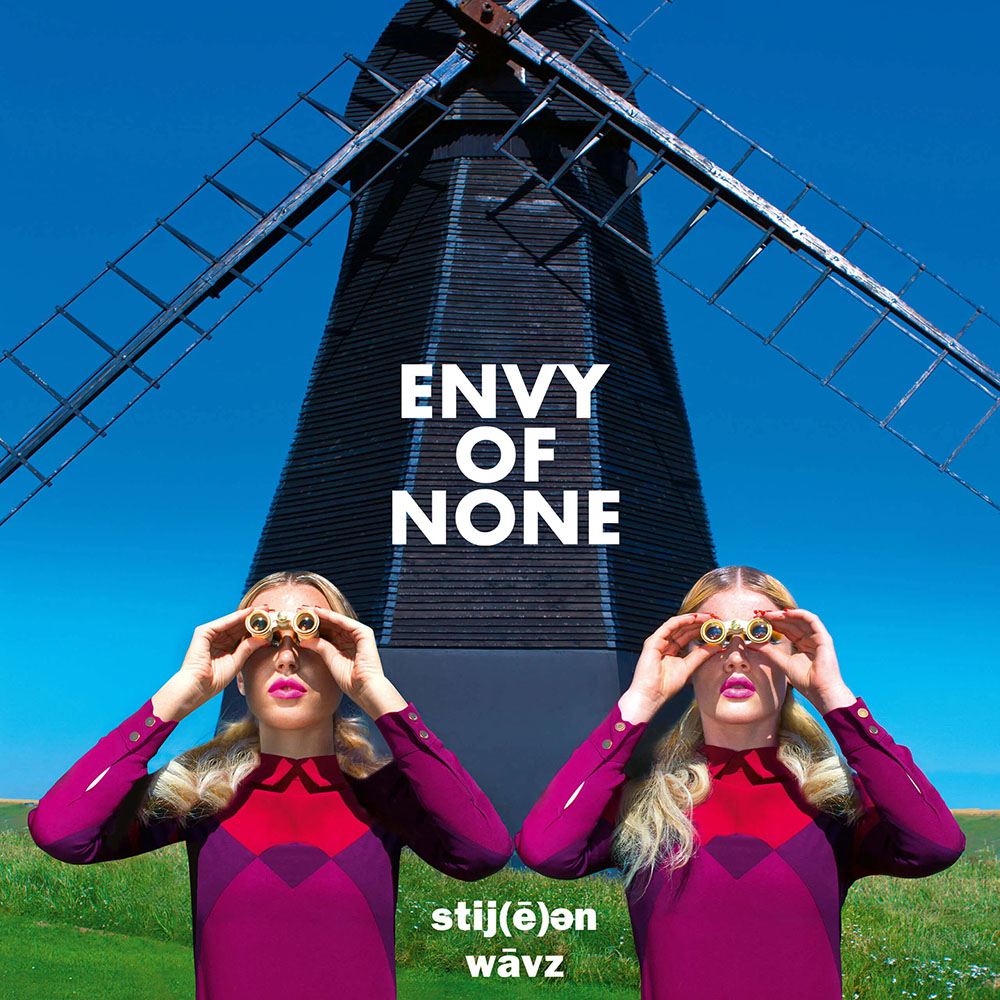 GM: It has the sound quality. So it’s almost like you need to get Envy of None on vinyl. I
think just for Andy Curran’s thunderous bass
and the rhythmic section, which picks up well
on vinyl. It just sounds better, I think.
GM: It has the sound quality. So it’s almost like you need to get Envy of None on vinyl. I
think just for Andy Curran’s thunderous bass
and the rhythmic section, which picks up well
on vinyl. It just sounds better, I think.
AL: Totally agree with you. Totally agree.
GM: And the weird thing, Alex, is that a lot
of the new generation, they'll buy vinyl and
maybe not listen to it. They like having the
gatefold and the colored record. It’s kind of
like going to a concert and getting a program,
right? You know what I’m saying?
AL: Yeah. I could see that. Yeah. Well,
that was the whole thrill of vinyl. Back in
the old days, you'd go to the record store.
I mean, you'd hitchhike or take a bus and
go to the record store, get that record, get
home, pull it on the sleeve, put it on, and
just look at that cover, listen to it, read every little thing on that cover, get up, start
the record over again and repeat. I mean,
it was just such a rite of passage, that first
record that you got and became part of
that vinyl world. And maybe that’s what
they’re trying to get a taste of.
GM: Do you remember the first record you bought?
AL: I remember the first record I bought
was Sink the Bismark by Johnny Horton.
I think I bought that in 1961. I think it
was released in 1960. And then the first
album I bought was High Tide and Green
Grass by The Rolling Stones. So that compilation of hits. And it was a big deal. I
saved my money from mowing lawns and
went to the store and bought an album. I
was pretty proud of myself.
GM: And the Canadian release on that was
pretty much like the American release, not
different like the U.K. release, if I can remember correctly. A lot of times the Canadian
releases had the same album covers, where
early Rolling Stones releases in the U.K. had
different album covers.
AL: Yeah, that’s true. And in fact, I think
that album does have a different cover in
the U.S.
GM: Well, anyway, I amreally hoping you
tour, or I get to see the stream, right? We'll
see. But, man, congratulations with this new
album. Thank you. It is wonderful to hear it
on vinyl. I wish I could send you a turntable,
or you'll get one.
AL: OK, I promise I’1] get one. I’ll go buy
one. (laughs) I'll save my lawn-mowing
money now and go get one.
-| Click HERE for more Rush Biographies and Articles |-

